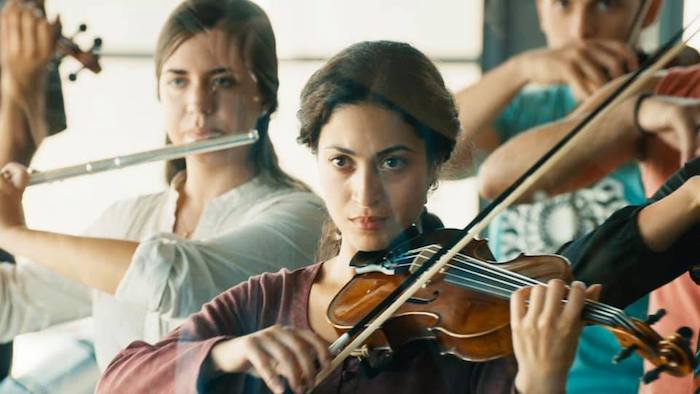
German-Israeli co-productions have emerged as an almost distinct subset of middlebrow art house cinema. Invariably, all the movies in this category deal either directly (Plan A) or indirectly (The Cakemaker) with the two countries’ fraught relationship owing to history, but they also use this dynamic to explore fairly problematic issues in the world at large. This 2019 film initially comes across as daring in this regard since it takes on the Israeli-Palestinian question, an issue the Germans would, understandably, approach delicately. Though perceived Israeli oppression of their Palestinian minority would likely alarm conscientious Germans who know from their own history what oppression of a minority can lead to, the fact is that the state of Israel rose from the ashes of the Holocaust, which was caused by the German nation.
Crescendo couches its presentation of this problem in a fictional act of restitution: a German-lead orchestra made up of both Israeli and Palestinian musicians. The almost flip motto of the international project—Make music not war—would seem to signal a somewhat cynical attitude toward such endeavors on the part of the filmmakers, and, at least in the beginning, the project seems to be more of a PR gesture than a concerted effort to bring people together. However, director Dror Zahavi favors melodrama over seriousness of purpose, a contradiction that is best represented by the German conductor chosen to lead the ensemble, Eduard Sporck (Peter Simonischek), whose first utterance is that his country should be forgiven for its past sins. In any case, he is strictly a man of the arts, and will not tolerate any political hanky-panky on his watch. Such a character is central to Zahavi’s canny dramatic strategy: Depict all the various ways that people attempt to come to grips with international strife as a means of showing how institutions need to address person-to-person matters first.
It’s a cliche born out by the tense subplots that keep the movie interesting. The Germans audition musicians in both Israel and the occupied territories, with Zahavi focusing on several players with markedly different backgrounds. There’s the Palestinian clarenetist who learned his instrument playing weddings and has never seen a French horn in his life falling in love with an Israeli who plays that instrument. Then there’s the proud, German-educated Israeli master violinist who bristles at the notion that he will have to compete with a proud female Palestinian violinist who he assumes has never studied as hard as he did. The maestro thus has to amend his normal working methodology against his will to account for these tensions, and he’s not always successful. Zahavi makes Sporck out to be a borderline asshole, which provides room for his own hackneyed redemption, but there’s an overdetermined quality to the dramatic arc as suicide bombings happen in the background and internecine conflicts wax and wane within the orchestra, which ends up relocating to Italy once the auditions end. One tends to wonder if the choice of program—Dvorak’s “New World”—is itself a cynical joke, but Crescendo is nothing if not forthrightly earnest, which is why it’s such a frustrating movie overall.
In English, German, Hebrew, Arabic and Italian. Now playing in Tokyo at Shinjuku Piccadilly (050-6861-3011), Human Trust Cinema Yurakucho (03-6259-8608).
Crescendo home page in Japanese
photo (c) CCC Filmkunst GmbH
